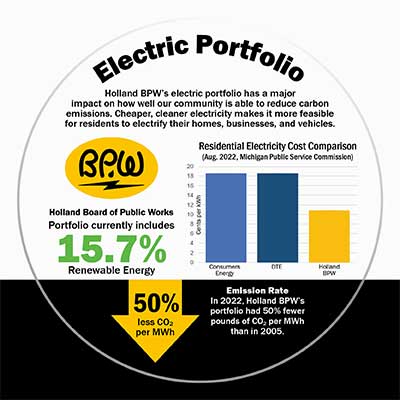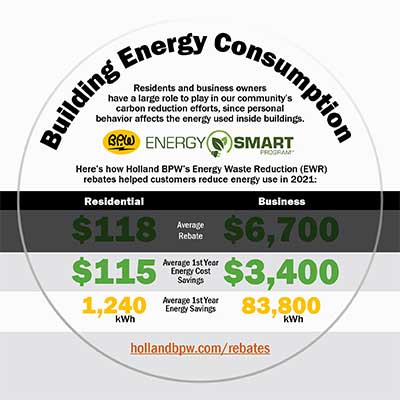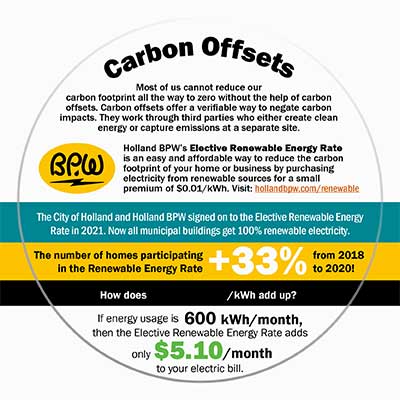Improving Energy Efficiency Together
Holland Community Energy Plan
Holland BPW and the City of Holland share a passion for the Community Energy Plan (CEP). The initial plan was published in 2011, with a goal to reach 10 metric tons of CO2 emissions per capita by 2050. At that time Holland’s carbon footprint was 24 metric tons of CO2 emissions per capita. When the James DeYoung Coal Plant closed and Holland Energy Park went into full operation in 2017, the City of Holland’s emissions were cut in half. This transition escalated positive progress on our CEP goal and left us asking how we would meet our goal, and if our goal was aggressive enough.
Every three years, City Council and the Mayor of Holland appoint a team of sustainability experts to the Strategic Development Team (SDT), who review the CEP and recommend revisions. The most recent results of the SDT were presented to City Council in September 2021. New accelerated targets were set for the CEP, making the new goal 12.25 metric tons of CO2 emissions per capita by 2030. Previously, the goal was 10.00 metric tons of CO2 emissions per capita by 2050. To facilitate the accelerated target, the SDT provided a strategy that identifies five key levers of focus for our community. Each lever includes a goal and suggested actions.
Key Levers

Electric Portfolio
Continue to shift Holland’s electric portfolio to prioritize emission levels that align with current climate science and regulatory guidelines while maintaining excellence in reliability and affordability.

Building Energy Consumption
Reduce carbon emissions coming from homes, businesses and other buildings.

Transportation
Reduce carbon emissions in the transportation sector.

Education
Establish a Community Education/Awareness Program to promote CEP programs, performance and goals.

Carbon Offsets
Take a leadership role in the creation of a community-based system to provide businesses and residents access to carbon offsets to meet their individual goals and commitments, including the option of local carbon offset projects.
Holland Community Energy
Plan Annual Report
Holland BPW and the City of Holland published the first Community Energy Plan Annual Report. Learn about the impact that all of us in Holland are making on our global community and how you can get involved. Together we will work towards a sustainable future through reduced carbon emissions.
Holland BPW Expands Energy Waste Reduction Goals
Recent changes in legislation gave Holland BPW a chance to redesign our Energy Waste Reduction (EWR) program with goals that reach beyond what the previous laws required us to achieve. As a strategically driven organization, we evaluated our program’s effectiveness with a consultant’s help. The results of the consultant’s work show that our programs help customers take action to lower their bills and reduce carbon emissions. Results also showed that we have room to grow our EWR energy-saving goals above and beyond what the former law mandated.
EWR Program Goals
Because behavioral changes can be hard to measure, we use rebates to quantify our EWR goals. Our teams carefully track the number of kilowatt hours saved for each rebate item and then compare the kilowatt hours reduced through LED lightbulbs, electric heat pumps, and other items to the total number of kilowatt hours BPW sells to its customers.
The previously mandated goal from the PA295 law was that 1% of total BPW electric sales would be saved through energy waste reduction measures. Our new goals increase that percentage over time.
2009-2021: 1.0% of total BPW electric sales saved by energy waste reduction measures
2022: 1.5%
2023: 1.75%
2024: 2.0%
Our new and more aggressive EWR goals will help us maintain low rates in the future. As our community grows, overall energy demand increases. Energy-smart behaviors delay the energy demand increases and the need for Holland BPW to make capital investments in new power generation resources so we can continue to offer some of the lowest electric rates in Michigan.
Holland BPW Electric Customers Save Money on Electric Tools with New Rebates
Replacing the James DeYoung coal plant with Holland Energy Park cut our C02 emissions in half. To reach Holland’s carbon reduction goal by 2025, we need help from the community at large. And to encourage community participation, we offer rebates to incentivize purchases that reduce emissions.
Holland BPW’s Energy Smart rebates help electric customers save money, reduce electric bills and provide a means to measure carbon reduction efforts made by individuals and businesses. Looking for ways to expand the rebate program, Holland BPW studied beneficial electrification, considering which electric tools and appliances we should incentivize.
Beneficial electrification means that choosing electric over gas-powered devices mutually benefits customers, the utility, and the environment. The criteria used to evaluate the products balanced cost savings for the customer with the difference in carbon emissions between electric and gas-powered. The team who completed the study, led by Chris Van Dokkumburg, identified that beneficial electrification is indeed beneficial! To incentivize this beneficial behavior, Holland BPW launched a new series of rebates for select electric lawn tools, heat pumps and water heaters, and electric panel upgrades.
“Research shows that beneficial electrification contributes to the overall reduction of greenhouse gasses by reducing the use of fossil fuels (such as natural gas, diesel, propane, etc.) as well as overall costs,” explained Van Dokkumburg. “The Holland BPW team of trusted advisors found that the estimated/modeled electric usage from the new equipment will both reduce carbon and increase energy efficiency through these new rebates.”
Find new rebates and learn more.